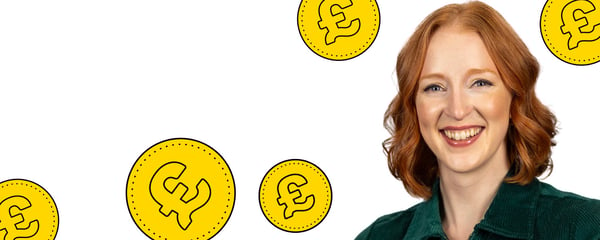
A Little Bit Richer
Iona Bain and guests will help you make smart money choices and get to grips with your finances for the longer term.
Latest episode
James: This series is brought to you by L&G, helping you build a future that's a little bit richer.
Iona Bain: Hello, I'm Iona Bain, and welcome back to A Little Bit Richer, the podcast helping you feel more confident about your money, one conversation at a time, brought to you by Legal & General. Today, we're kicking off a two-part series all about investing. And if your immediate reaction to that is, well, sounds a bit overwhelming, sounds a bit risky, probably not one for me, you're very much not alone. So, whether you are already investing and wondering if you're getting things right or you just want to learn more about this sometimes quite daunting area, in this first episode, don't worry, we're not going to be diving straight into funds or portfolios. Instead, we're going to be talking about why investing can help your financial future, why we need to learn about emotions, and how we can keep a cool head and make informed decisions.
And joining me to discuss all this is friend of the show, Emilie Bellet. Emilie is a former private equity analyst turned entrepreneur, author, and speaker. Emilie founded the financial education platform, Vestpod, and hosts the podcast, The Wallet. So, she is just the person we need to talk to today, to help investing feel a little more accessible. Welcome, Emilie.
Emilie Bellet: Thank you.
Iona Bain: Can you explain in 30 seconds or less what is investing and why it's so important? I'm going to put my timer on. Okay, go.
Emilie Bellet: With investing, you want to make your money work for you, and this is going to help you to achieve your long- term goals. That's different from saving money, where you put money into a safe place that you can access anytime that's really good for your emergency savings and short- term goals. With investing, you're going to put money into things called assets like shares, bonds, property, with the goal to grow your money over time.
Iona Bain: Brilliant. I think you had about five seconds to spare there. That is excellent work. So, that's a really good summary of what investing is and why it's important. But a lot of people watching and listening might be feeling quite nervous about the prospect of investing, particularly when they look at what's going on in the world. We've got geopolitical turmoil and uncertain economic outlook, frankly, lots of pressing headlines. And they might be wondering, why should I take risks with my money right now? Surely, it's better to just play safe.
Emilie Bellet: Yeah. So, I really understand why people feel a little bit uncertain about the stock market. But here, I think we have to differentiate between uncertainty and risk. So when you're investing money, and here we're talking about investing, achieving your long- term goals, you want to know the level of risk you're taking. Now there's the uncertainty on the market, no one can predict what's going to happen in the stock market. We see big draw- downs in the stock market where the market goes up and down at different points in time. So, what you want to have is time for your money in case something happens in the stock market and for your investments to recover. So, I think that's the difference.
There's not a perfect time to invest. Maybe it was yesterday or today, but I would say, don't just wait and get triggered by everything that's going to happen. There's always going to be news on the market, but just getting started on a very small scale and try to be in the market, rather than timing and finding the best time to invest is actually going to be quite helpful with your investments. And it's not about putting all your savings into investing or into an investment pot today, but slowly, a step- by- step, building up a pot over time.
Iona Bain: And years ago I heard of this phrase, " Reckless conservatism," which really resonated with me because it indicates that actually, if you are too safe with your money at times, that that in and of itself can be a bit reckless and irresponsible. That can be quite a difficult concept for people to get their heads around, can't it?
Emilie Bellet: I think it's quite tricky to understand that having all your money in cash, so in something really safe, is actually risky because you think, oh, all my money's in my bank, I'm getting an interest rate or small saving rates. But actually, what we have to look for when we invest is that there's inflation in the economy, and also, you want your money to grow faster. So this is why with your investments, you want to try to beat inflation or at least keep up. The economy is growing and you want your money to grow over time. So when you're thinking short term, it doesn't matter so much over a period of one to five years, but when you see longer picture, you lose purchasing power over time. So, keeping everything in cash is not always the solution.
Iona Bain: Yeah, it's a really good point. Now, many people who are watching and listening to this might be thinking, I'm not an investor. Why is that not necessarily true?
Emilie Bellet: So, this is what I hear very often, " I'm not an investor, this is very scary. I don't know where to start." And I think your first touch point is maybe your pension. I mean, if you have a workplace pension, most people will be actually invested in the stock market. So your money every month, you are saving money, your employer is putting money into your pension. This is tax efficient also, which is amazing. And the money will go into usually a selection of funds, so you will be exposed to a lot of companies in a lot of different markets and industries. So, your money is invested. So I feel that's already a win, you are an investor, and then that's maybe your starting point when you want to look at your investments.
Iona Bain: And so, if people maybe don't necessarily rush out and start investing after today, perhaps they can already start to understand this whole area just by engaging with their pension a bit more.
Emilie Bellet: So, this is a really good starting point. First of all, find your login details for your pension. I mean, if you don't necessarily check very often your pension, you don't know where it is, who's the provider. So, find your statements, go online, call your provider, try to log in into your pension. And then what you can do is review your contribution. How much money are you putting into your pension every month? Is your employer contributing to your pension and how much? Can you actually change this contribution? Can you increase them if you have the saving and investing capacity?
And then it's looking at, how is my money actually invested? And you'll be surprised to see a series of funds. So, that's quite interesting to look at how it invested. You'll see the allocation, stocks and bonds and cash, and also maybe the type of funds and the level of risk. So usually, you will see three level of risk, A, B, C. So you will be adventurous, balanced, or cautious. And it's just making sure you are in the right level of risk for your age and the time horizon. If you're in your 20s, it's very different than if you're in your 50s, for example, when you look at investing for retirement.
Iona Bain: Yeah, it's really important to know what is appropriate for your stage in life because if you're younger, you can maybe take more risk, if you're older, maybe you play it a bit more safe.
So Emilie, this is a bit of a tough question, but I have a feeling that you're going to be up for answering it. What's one mistake that you wish that you hadn't made but that you've learned from when it comes to investing?
Emilie Bellet: Oh, there's a lot of mistakes I've made, but I think one is around picking individual stocks. So when we talk about investing, we don't want to buy one thing and just hope for the best. So, we want to diversify our money into a lot of different asset classes. We want to be invested in the market, and the market is just like a collection of tens of thousands of companies.
Now when I started investing, I built a very small portfolio of a handful of individual stocks, but then they were all in the same industry because I had more knowledge in this industry, probably all in the same geography. And also, only having five stocks is quite problematic. So, one of these companies starting to have operational issues that impacted its profits. Investors started to look at this company and started to lose confidence. I panicked, I sold my investments. Of course, the stock recovered a few months or a few years later, but I had a loss in my portfolio. And that one stock, I would have five, that's like 20%. So, that's a big mistake and that's why now I'm not going to look at single stocks, only if it's a very small part of my portfolio, but try to diversify via funds that will have hundreds or thousands of holdings.
And the other one is checking your stocks on your phone and overreacting, I think.
Iona Bain: Yeah, I've been there.
Emilie Bellet: Oh, you have been?
Iona Bain: Yeah.
Emilie Bellet: And I think the two emotions that investors are triggered in the stock market is around fear and greed. My greed was to wait for the stock price to go higher and higher and higher and sell at the right time. When is the right time? And also fear, the fear of losing more money, and that's when I sold. So when you go into investing, it's really having a clear mind, being a bit more of a passive investor, so not overreacting to market fluctuations, and you can do that when you have a plan. So you know what you want your investments to achieve, for how long you're investing, what are your goals behind it? And having this on a piece of paper, it doesn't need to be complicated. At least you know what you're doing with your investments.
Iona Bain: Yeah, it's really hard though, isn't it? When you see your portfolio on your phone and if it has been going up, it gives you a dopamine buzz and then you become addicted to checking it. And even when it starts to go down, you just can't take your eyes off it. So, it's one of these areas of finance where actually, paying a little bit less attention is probably a good thing.
Emilie Bellet: It's a good thing, and I think investing should be boring. When investing starts to be a little bit exciting, that should probably be a red flag. You should ask yourself, is it actually too good to be true? And if it is, it's probably that you shouldn't invest or you should do more research.
Iona Bain: Yeah, very good point. Emotions as you were saying there, they really, really do drive a lot of investing decisions. And I think all of us like to think we're rational, cool as a cucumber. Can you just talk me through how we can keep calm when markets feel like they're going a bit crazy?
Emilie Bellet: So for me, it's about having this plan, first of all, being financially organized. So you have a budget and you know how much money you're putting into your investments every month. It's better to automate your investments so you are not deciding every month, oh, how much money should I invest this month? How much money should I save? And if you invest money, what funds do I buy this month? So I automate my investment, which means that every day on payday, a little bit of my pay is going into an investment portfolio. So, that removes any decisions for me to pick and choose whatever I want to buy. Now, there's times in a year where you can review, sit down, and look at your investments and check that your contributions are invested properly. So making sure you take a step back, I think it's fine to switch off financial and investing news sometimes. So if there's some areas that you're interested in, maybe take the time to research these areas instead of reacting to market fluctuations.
So I would say have a plan, maybe don't check, automate some of your investments, and know when there's information overload. If you've been on some social media, it can be quite, quite triggering and you feel you're missing out, and that's a pretty bad emotion. The former where you're like, something is happening, everyone knows what we invest in, and I'm just sitting there doing nothing. So when you're feeling this, it's probably time to just switch off, go for a walk, switch off your investment app.
Iona Bain: So you’re a massive advocate, Emilie, for getting more women into investing, helping women understand that investing is very much for them, it's not just for the blokes. But there are myths and concerns that surround the whole area of women in investing. So, what would you say to challenge some of those myths and concerns?
Emilie Bellet: So what I hear very often in classes and boot camps is around, " I don't have a lot of money to start investing. I don't know enough. I need to be an expert. It's also too late."
Iona Bain: And what age typically do women say that to you?
Emilie Bellet: When you look at women, we may not have a linear career path. We know that women are still the primary carers for their families, for communities, for their children. So they may step out of work or earn less for a certain period of time, so usually 30s and 40s. So if it's less money invested, maybe they don't have the capacity to invest or maybe they're investing less. And because we know that investing compounds, the money that you haven't invested early on in your life then will not compound over a longer period of time.
Iona Bain: Yeah, so then women have this sense that they've missed out.
Emilie Bellet: And they've missed out on retirement, and sometimes they want to start and open a pension and they look at maybe a retirement calculator and they realize, oh wow, I will need to top up my pension, I need so much money now. So it's a little bit of, I'm not going to do it, I procrastinate, or I do it later. So what I say is, it's never too late to start and also, it's never too small. So you can start literally with, I mean, some platforms today even allow you to invest your spare change or even with 25 pound, 50 pound a month, you can start building a pot, especially a pension.
We are usually quite good at thinking about short term goals, your next holiday or what you want to achieve next year, but what we need is a little bit more of a plan. It's very important that they look at their life goals and match them with their financial goals. What do I want to achieve in the short term? But at the same time, how do I pay myself for when I retire? Once people start even putting a little bit of money in the stock market is quite reassuring, they understand they can do it, and then they can work on their long- term goals.
So I think we need to change also the mindset around investing. I think anyone can invest after having some savings of course, and repaid some of your expensive debts, but it's just about getting started. And I think now there's a lot of structural issues, gender pay gap, women earning less, taking career breaks, so that's going to have an impact on their pension and how much they can actually save and invest. And it's very important to build individual safety nets and individual security. So if you've been relying on your partner, it's making sure you start building your pot, you start building your investments, even if they're much smaller. But having this level of first financial security and then financial independence is going to be really important.
Iona Bain: Very well argued. So, I have a confession to make now, which is that I have been on a break from investing. I want to go back to it, but I want to buy a house in the near future and I want that money to be there for me, should I need it. And I'm imagining a lot of people do feel in the short term if they want to achieve certain goals like buying a house, that investing is not the right thing for them to do. Is that a sensible decision, Emilie, or am I wrong to have a break from investing?
Emilie Bellet: I think you know better than anyone what you need and what are your goals. We all have a different life and we save for different things. So when you invest, you should really go back to your goals. And I love to break my goals into short- term goals, medium term goals, and long- term goals. Here, you're talking about one of your goals that is buying a house, and depending on how far or how quick you want to achieve this goal, you will need to put money into these pots. So ideally, in the perfect scenario, we put some money into each of these pots, short- term goals, medium term goals, and long- term goals.
What I would say is, depending on also where you are with work, it's completely fine to address your contribution depending on how money you need to cover also your lifestyle and to cover your needs. So you don't want to be in a position where you have a lot of credit card debt, you're struggling to repay, debt starts to snowball, but at the same time, you're investing when you're paying a lot of money on your interest. Same when you don't have an emergency fund, maybe you can keep investing a little bit, but also build this fund that you will have in case something happens. Because the problem with investing is that the money is invested in the stock market. If you need cash for any reason but if something crazy happens, tomorrow the stock market crashes, your investments drop maybe 20%, 30%, but you need the money. Where are you going to find the money if you can't sell your investments at a decent price? You're probably going to go with credit card debt or overdraft. So, it's all about managing what you need, what are your goals, versus what you can do.
But I would say is, I don't think you should stop investing because of the uncertainties on the market. You may think, oh, look at what's happening today, I don't know when I'm going to start investing again. So maybe you have lower contribution, you keep investing, and then when the time is right, then you can start and up your contribution. Because we think as investing as sacrificing a little bit of money, it's locked for a long period of time. But think of it as really paying your future self and really visualizing why you will need the money and how you will use the money in the longer period of time.
Iona Bain: Yeah, and feeling inspired to invest because you know that that's going to be building up that bigger pot for you so you've got more choices further down the line. Okay, Emilie, you have convinced me that I may be ought to just get reconnected with my investing portfolio and it'll be for my own good.
So, there will be people watching and listening who might be thinking, investing is not something that I can do right now. Maybe because I've got credit card debt, maybe it's just something that I just don't have the bandwidth to really think about. But what are some of the reasons why people should have a baseline of knowledge about investing, regardless of whether they do it or not?
Emilie Bellet: I think you can just really understand the basics of investing, that it's a way to build wealth over a long period of time, that your goal is to beat inflation. So, I really see it in two buckets, saving, short term, investing, medium to long term. So, that's the first thing you need to understand.
The second thing is around maybe scams and anything that could happen around the investing space. Maybe people want your money. We've seen a lot of scams going around on social media, phishing emails and stuff like that. So just understand what is legit or not with investing, and these are very common and people feel for it. So if it happened to you, don't worry, it happened to so many people.
Iona Bain: That's really, really good advice because people could perhaps see something online and think, well, that looks like a fantastic scheme, I really need to get in on this. But actually, if it's too good to be true, then you need to walk away, and that's why I need to understand why investing works.
Emilie Bellet: It's about learning about yourself and your reaction when there's big moves in the stock market.
Iona Bain: Learning by doing.
Emilie Bellet: Learning by doing.
Iona Bain: So, if viewers and listeners are anything like me, they'll want to go and have a cup of tea or a cup of coffee after listening to this chat and really think about what we've been talking about today, because it's been so fascinating. But whilst they're waiting for the kettle to boil, what's one thing they could do after our discussion today?
Emilie Bellet: So, one thing they could do is probably check their pension contribution. How is their pension invested? And if you don't have a pension, is maybe getting informed about opening maybe a personal pension or a SIP and really trying to think about your future self, and this should be one of your top goals.
Iona Bain: Fab, log into your pension account. Great stuff. Thank you so much, Emilie, it's been such a pleasure having you.
Emilie Bellet: Thanks for having me.
Iona Bain: That's it for part one of our investing chat. In part two, we'll be getting more practical. We'll talk through the different ways you can invest and how to build a diversified portfolio. So, if today helps you feel a little bit curious about investing, part two is where we'll turn that confidence into action. So, why not share this episode with a friend? Start your investing journey together and help them get a little bit richer too.
This podcast is brought to you by L&G. You can keep up with the show on YouTube, TikTok, and Instagram, at Legal & General. If you have a question or a topic that you would answered on the show, then you can get in touch on our socials. And until next time, see you soon. Thanks for listening and watching.
Recent episodes
Preparing for life's big moments
It can be hard to know where to begin when it comes to thinking about the future. We help you prepare for life’s milestones, from buying your first home to saving for retirement.
Listen back
Read more

How much should I put into my pension?

Pension myths




